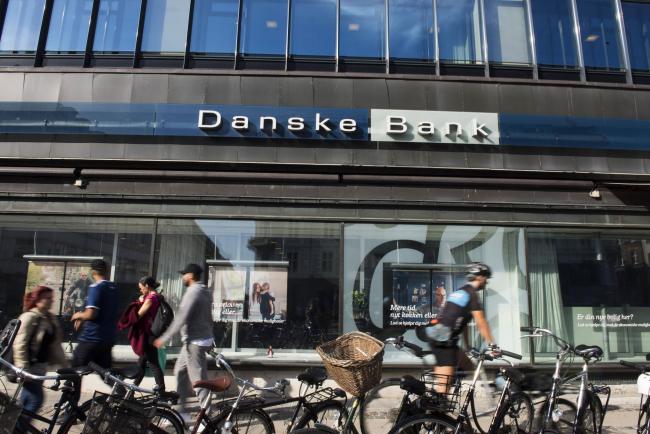(Bloomberg) -- Danske Bank A/S (CSE:DANSKE) will resort to job cuts in its fixed-income and currencies unit as part of a plan to revive profits, it said on Friday.
Details of the measures, contained in a slide that accompanied third-quarter results, show the bank is planning “short-term cost reductions of up to 15% of direct staff costs.” Danske says it hopes most of the cuts will take place through its hiring freeze and “voluntary resignations.”
The bank also used its quarterly report to lower its guidance for a second time since July in response to an increasingly tough business environment shaped by growing compliance costs and negative interest rates.
Denmark’s biggest bank, which is being investigated for money laundering across Europe and in the U.S., reported net income in the third quarter that missed analyst estimates. It now sees net income for 2019 at the lower end of its previously targeted range of 13 billion kroner ($1.9 billion) to 15 billion kroner.
Danske said that measures it’s taking to improve its efficiency “will have a significant effect on the result for 2020, for which we expect a return on shareholders’ equity in the range of 5-6%,” which is considerably lower than previous goals.
Shares in the bank opened about 4% lower when trading started in Copenhagen. The Bloomberg index of European financial stocks was little changed.
“The first nine months of 2019 were characterized by challenging interest rate levels and margins as well as higher impairment levels and an increase in costs, related especially to compliance,” Chief Executive Officer Chris Vogelzang said in a statement on Friday. “We saw a good underlying business with high customer activity and lending growth, but overall, our performance is under pressure.”
The bank’s guidance “is very low” and will disappoint shareholders, Per Hansen, an investment economist at Nordnet, said in a note. “Danske Bank is in a transition phase,” he said. “2019 won’t be great, 2020 will be worse and no one knows what will come in terms of U.S. financial penalties.”
Danske is still dealing with the fallout of its $220 billion dirty-money scandal, and investors are bracing for fines potentially in the billions of dollars. Against that backdrop, regulators have ratcheted up compliance requirements, which come on top of years of extra capital demands. Nordea Bank Abp, the biggest Nordic lender, has had to cut thousands of jobs to adapt to the tougher environment, and has recently made clear there’s more to come.
In its slide on fixed-income and currencies, Danske said the unit faces variety of headwinds including a risk that monetary easing will reduce market volatility. Net trading income fell by two-thirds from a year earlier, depressing income in Danske’s corporates and institutions division, it said.
Danske is operating under an extreme monetary environment in its home market, where interest rates have been negative for more than seven years. A number of Danske’s competitors have responded by passing negative rates on to retail depositors. But most have acknowledged the climate is making it increasingly difficult to run a traditional bank.
Danske also set new targets for 2023. The bank says it wants “to be among the top two on customer satisfaction in everything we do.” And it’s set itself a goal of achieving a return on shareholders’ equity of 9-10%, and a cost-to-income ratio in the low 50s, “by continuously improving the profitability level.” Danske maintained its dividend policy, targeting a payout of 40-60% of profits.
What Bloomberg Intelligence Says:
“Danske Bank’s new guidance cut is disappointing, yet 2020 should be the low point, with new 2023 targets (9-10% ROE, low-50% cost-to-income ratio) offering a return to normality. Extra anti-money-laundering costs are expected to lower 2020 ROE to 5-6% vs. consensus’ 8%, with those charges fading thereafter. Danske Bank will remain embroiled in its Estonian money-laundering scandal until clarity emerges regarding likely U.S. and domestic fines the lender faces, which we don’t expect until late 2020. Nevertheless, Danske’s $9-$10 billion of lost market capitalization -- which we attribute to the affair -- dwarfs the $2-$2.5 billion fine we ultimately expect, while its capital buffer (16.3% CET1) of about $4 billion cushions that risk. Elevated compliance costs and revenue headwinds wiped about 40% off current-year EPS consensus, but both are likely to return to improving trends after 2020.”----Philip Richards, Senior Banks Analyst at Bloomberg Intelligence
Danske’s lowered guidance comes not long after the bank appointed Vogelzang as CEO. Since starting in June, he has made rebuilding trust in the bank a top priority. His predecessor, Thomas Borgen, was fired last year and has since had preliminary criminal charges brought against him, along with a number of other former executives at the bank.
Danske’s share price has slumped about 25% this year. It lost almost half its market value in 2018, and the bank now faces a number of class-action lawsuits from disgruntled investors. This is the second time Vogelzang has lowered the bank’s 2019 outlook since becoming CEO. Danske last issued a profit warning in early July, citing low margins and a weak trading income.
